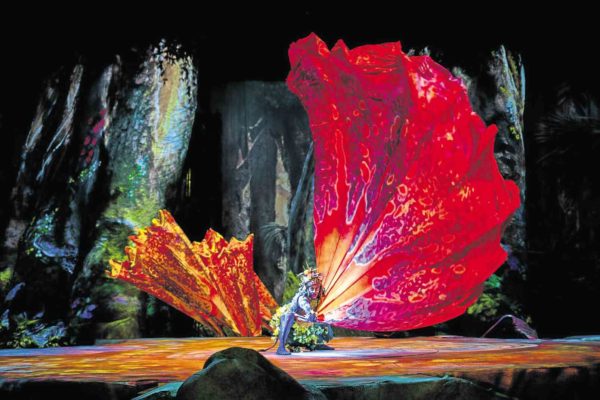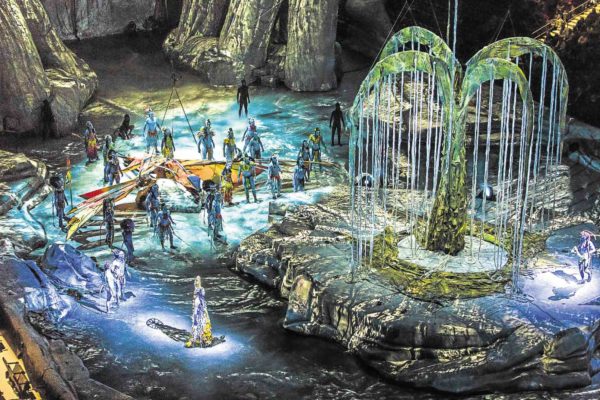
Scene from “Toruk: The First Flight”
Toruk: The First Flight,” the touring circus show based on James Cameron’s blockbuster sci-fi film “Avatar,” wasn’t so much about the breathtaking display of superhuman feats that have become synonymous with Cirque du Soleil as it was about providing a magical environment in which the viewers could immerse themselves.
In “Toruk,” which runs until July 2 (call 470-2222), the SM Mall of Asia Arena is transformed into Pandora—the distant moon that is the home of the blue-skinned, extraterrestrial tribe called the Na’vi—through the confluence of technology, visual arts, music and, of course, the ensemble’s relentless athleticism and unerring dexterity.
Unlike other Cirque productions, the show follows a definite story, told with the aid of an on-site narrator. The story takes a few thousand years before the events in the movie, and revolves around coming-of-age hunters, Ralu and Entu.
They set out to gather five talismans that will give them the power to summon and tame the titular Toruk—a flying behemoth that will, in turn, help them protect Pandora’s life source, the Tree of Souls, from impending doom.
As the journey progresses, the landscape shifts from mystical jungles to foreboding caves and treacherous walls of jagged rocks. The visual effects are executed with sophisticated video projection and intricate movable props, which likewise allow the set to simulate natural catastrophes like volcanic eruptions, earthquakes and flash floods.
The stage bristles and bustles with dynamic action, especially during elaborately staged Na’vi rituals and combats, with lithe performers maximizing the space, dancing, leaping and running around the perimeter. They dive into hoops and square off against beasts controlled by puppeteers. They fly kites, swing on scaffoldings, then dismount with a series of flips. In the show’s more solemn scenes, tribal chants add eeriness into the air.

The production has two standout numbers: One was Entu’s solo aerial dance, which had him twirling in a swathe of cloth. He contorted his body to form interesting positions—all done in a frantic fashion, as if conveying inner turmoil. The other one involved a swiveling, skeleton seesaw, on which five acrobats held different variations of handstands and planches.
Such showcases, however, are few and far between. And while the rest of the stunts undoubtedly require supreme physical gifts, they don’t always elicit a sense of danger and uncertainty that makes viewers hold their breath.
But then again, “Toruk’s” main driving force is its visuals seemingly designed, not to make the crowd gasp, but gush—like in the segment in which blazing orange petals rise and drift in the wind, or where Toruk arrives gliding and flapping its wings; or when, at last, the Tree of Souls turns into a whimsical centerpiece that remains illuminated in pink and blue.

